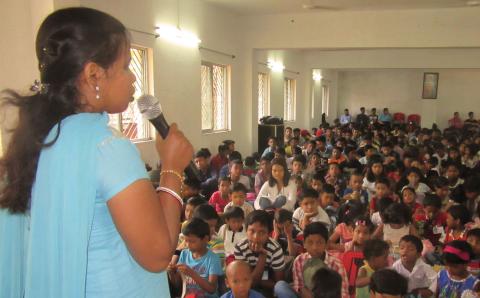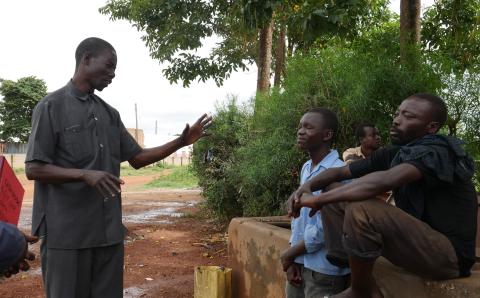Prophetic Witness
I was excited when I began to read your editorial “Prophetic Witness in Turbulent Times” (Jan. 2018). At first it seemed that you were stepping out of the CRC comfort zone to deal with a variety of issues. But speaking against abortion can hardly be safer in our circles.
There are plenty of other issues that affect everyone, including Christians, but they seem to be meticulously avoided. I believe that if a woman was pregnant and bearing the fetus to full term would almost certainly kill her, you would agree abortion would be justified. The point is that there are exceptions, and to deal with it in absolute terms is totalitarian. Please revisit the subject—and many others.
Jake Terpstra, Grand Rapids, Mich.
Much appreciated your editorial “Prophetic Witness in Turbulent Times,” especially the closing suggestion “we must establish and support Christian organizations that provide counseling and support to women facing unexpected pregnancies.” I serve on the board of just such a proactive organization: Beginnings Family Services, a Christian adoption and counseling agency in Hamilton, Ont., with three care centers in Woodstock, Guelph, and Northumberland.
Last year we achieved 20 open adoptions, counseled and supported hundreds of clients, and were privileged to be at the forefront of an embryo adoption program. It is our objective to show the love of Christ by building strong families. Indeed, prophetic witness in turbulent times.
Herman Praamsma, Brampton, Ont.
I wish to take the discussion on abortion and how Christians could respond to another level (“Prophetic Witness in Turbulent Times”). I am a volunteer at a hospice. From time to time I find out a patient has died according to Medical Assistance in Dying (MAID), a Canadian practice.
A Christian friend of mine who has been experiencing tremendous pain for a few years said to me, “You do not know what it’s like. I need the comfort of knowing this can end.” I have not experienced such pain. But to rework your last paragraph, I might say, “Out of our hope in Christ, we can offer comfort to those whose lives have been affected by intense pain. Am I a victim? Why am I put in such a situation where I feel God would allow me to end my life on my terms? What support is available to help me through this what seems like interminable misery of living? Those who are partners in health can’t stand by and protest, withdraw, or condemn. In what ways can we show prophetic witness?”
I am looking to the church to help me analyze the future on this issue.
Mike Hoyer, New Westminster, B.C.
Clergy Couples
My parents were a couple that ministered together back in the day when the pastor was assisted and supported by his wife (“Clergy Couples: A Small but Growing Part of the CRC,” Jan. 2018). There was no church secretary or ministry team to lead the congregation.
My mother taught catechism classes, led women’s groups, and taught Bible study groups in her role as “helpmeet” with my dad to lead the congregation in their spiritual growth.
Mom and Dad were both Calvin grads, she in teaching and he from the seminary. They were one of many “clergy couples” of that era. They were successful and well loved in the churches they served.
Ruth Veltman Ruiter, Grand Rapids, Mich.
Revamped Banner
Something I’ve noticed about The Banner, aside from the beautiful new design (Jan. 2018), is that the articles are written mostly by people in the CRC. But the covers and illustrations are often stock footage or by artists outside the CRC. I attend Church of the Servant (Grand Rapids, Mich.), and within just our congregation, I can think of many artists and photographers whose work could grace the cover.
If this is true of our congregation, how many other folks in the CRC are making art that could be used? I wish those who choose the covers and art for The Banner would cast a net within our denomination to affirm the work being done by artists and photographers in our midst and list a credit for their work.
Virginia Wieringa, Grand Rapids, Mich.
Pleased to read the Banner’s well-structured format with a clear front cover page and bold lettering. Also the contents page that draws our attention to what we should focus on. . . . I appreciate the well-ordered arrangements of items throughout the magazine with diverse news items. I like to see articles not exceeding much over 500 words. Also [in favor of] deleting Punch Lines.
George Lieuwen, Langley, B.C.
Here are my comments about the new Banner:
I find the type harder to read. I miss the “funny page.” Was that not well liked? Under “Big Questions, Relationships”: Yes, there are many self-help options available, but sometimes counseling is necessary, and it is expensive. There was no solution offered to this dilemma.
Carolyn Vrieling, Salmon Arm, B.C.
Ny Ly
A wonderful story, wonderfully told (“Ny Ly: ‘Life Is All the Proof I Need’,” Dec. 2017). Amazing— just amazing. Thanks, Jim [Schaap].
Eric Van Dyken, online comment
Gentiles and Grace
While I appreciate Matthew Tuininga’s attempt to demonstrate the reality of grace for homosexual Christians (“Gentiles, Homosexuals, and Grace in the Body of Christ,” Dec. 2017), he seems to suggest that the fruit of grace for homosexual Christians is “repentance.”
In the 1960s I was privileged to work as a clinical social worker with struggling Christian homosexuals who were requesting help in hopes that they could become heterosexual. These young people had not made a decision to be homosexual. As a committed Christian I concluded I had no choice but to help them accept who they were and to find meaning and purpose in their Christian life.
My prayer is that we may find as a church an openness to welcoming gay and lesbian Christians into our faith community while blessing them and accepting them as fellow believers.
Dick Houskamp, Grand Rapids, Mich.
We are saved by grace. And we “walk worthy of our calling” by obedience (Eph. 4:1). Be careful of accusing Bible-believing saints of “forcing others to keep the law as a condition of salvation” just because these saints are striving to glorify God by “holding fast the form of sound words” (2 Tim. 1:13) and exhorting other believers to do the same (“Gentiles, Homosexuals, and Grace in the Body of Christ”).
Sandi De Hoop, Bellflower, Calif.
Strength of Networking
Thank you for your good and godly work each month. I was a little disheartened to read the following in “Strength of Networking” (Together Doing More, Dec. 2017): “Despite the diversity of those in the room, the consensus at the end of the evening was that it was good to be together.” I would hope that diversity would soon be the reason that people agree that it was good to be together, and/or that reporting would not set diversity against the goodness of togetherness. I was at this event, and I didn’t feel like diversity was an obstacle we had to overcome! Meant with good cheer.
Dave Vroege, Halifax, N.S.








